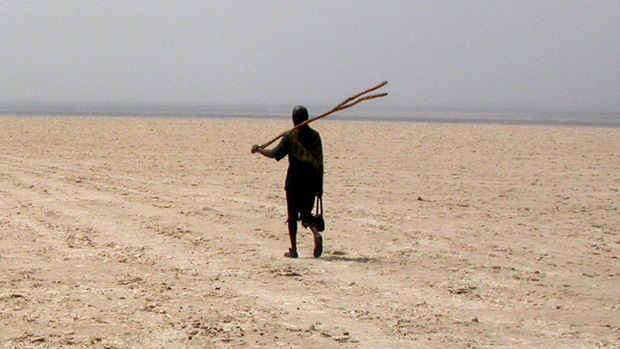Fossil discovery in Ethiopia could rewrite history of human evolution
Scientists believe jawbone dating back 2.8m years belongs to one of the world's very first humans

A free daily email with the biggest news stories of the day – and the best features from TheWeek.com
You are now subscribed
Your newsletter sign-up was successful
Scientists in Ethiopia have discovered a fossilised jawbone which they believe could push back the beginning of humankind by almost half a million years.
The 2.8 million-year-old fossil was unearthed in the Ethiopian desert by local graduate student Chalachew Seyoum, who said he was "stunned" by the discovery.
The jawbone that may be a window into the moment humans first emerged . http://t.co/daF3bMHaxH #awesome pic.twitter.com/boWC6ko5nq — Pallab Ghosh (@BBCPallab) March 4, 2015
"The moment I found it, I realised that it was important, as this is the time period represented by few (human) fossils in Eastern Africa," he told the BBC.
The Week
Escape your echo chamber. Get the facts behind the news, plus analysis from multiple perspectives.

Sign up for The Week's Free Newsletters
From our morning news briefing to a weekly Good News Newsletter, get the best of The Week delivered directly to your inbox.
From our morning news briefing to a weekly Good News Newsletter, get the best of The Week delivered directly to your inbox.
The bone, which is the left side of the lower jaw and has five intact teeth, is believed to belong to one of the world's earliest humans. It could shed light on a crucial period of human evolution.
Scientists believe the fossil will help narrow the evolutionary gap between the primitive "ape man" known as Australopithecus afarensis and the more "human" Homo habilis.
"It's an excellent case of a transitional fossil in a critical time period in human evolution," Bill Kimbel, director of the Institute of Human Origins at Arizona State University in Tempe told The Independent.
Homo sapiens, our species, appeared only 200,000 years ago and until this discovery, the oldest remains from the human genus came from the Homo habilis species 2.3 to 2.4 million years ago, according to Reuters.
A free daily email with the biggest news stories of the day – and the best features from TheWeek.com
"By discovering a new fossil and re-analysing an old one we have truly contributed to our knowledge of our own evolutionary period, stretching over a million years that had been shrouded in mystery," said Fred Spoor of University College London.
"The dating of the jawbone might help answer one of the key questions in human evolution," says the BBC's science correspondent Pallab Ghosh. "What caused some primitive ancestors to climb down from the trees and make their homes on the ground?"
-
 Magazine solutions - February 27, 2026
Magazine solutions - February 27, 2026Puzzle and Quizzes Magazine solutions - February 27, 2026
-
 Magazine printables - February 27, 2026
Magazine printables - February 27, 2026Puzzle and Quizzes Magazine printables - February 27, 2026
-
 ‘The forces he united still shape the Democratic Party’
‘The forces he united still shape the Democratic Party’Instant Opinion Opinion, comment and editorials of the day
-
 Epstein files topple law CEO, roil UK government
Epstein files topple law CEO, roil UK governmentSpeed Read Peter Mandelson, Britain’s former ambassador to the US, is caught up in the scandal
-
 Iran and US prepare to meet after skirmishes
Iran and US prepare to meet after skirmishesSpeed Read The incident comes amid heightened tensions in the Middle East
-
 Israel retrieves final hostage’s body from Gaza
Israel retrieves final hostage’s body from GazaSpeed Read The 24-year-old police officer was killed during the initial Hamas attack
-
 China’s Xi targets top general in growing purge
China’s Xi targets top general in growing purgeSpeed Read Zhang Youxia is being investigated over ‘grave violations’ of the law
-
 Panama and Canada are negotiating over a crucial copper mine
Panama and Canada are negotiating over a crucial copper mineIn the Spotlight Panama is set to make a final decision on the mine this summer
-
 Why Greenland’s natural resources are nearly impossible to mine
Why Greenland’s natural resources are nearly impossible to mineThe Explainer The country’s natural landscape makes the task extremely difficult
-
 Iran cuts internet as protests escalate
Iran cuts internet as protests escalateSpeed Reada Government buildings across the country have been set on fire
-
 US nabs ‘shadow’ tanker claimed by Russia
US nabs ‘shadow’ tanker claimed by RussiaSpeed Read The ship was one of two vessels seized by the US military